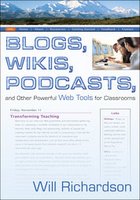
Although a lot of people are discussing blogging (and even educational blogging) on-line, it is hard to find any published research on the topic.
Why do we need research?
Although I believe that the combined experiences informing the opinions of professional people are useful, research is also needed to confirm the truth about these ideas. If research demonstrates that blogging really is effective, directors of education may encourage and support the use of blogging in classrooms.
This theme for the need to research blogging is repeated throughout the literature that I read this summer. I am including a sampling.
“Little research has been conducted on the use of blogs for education, knowledge management, and performance improvement, thus pointing to a need for further exploratory study” (Wang, Fix, Bock, 2004, p. 1).
“It remains unclear whether blogs can promote higher levels of reflective practice among middle school teachers. Further research is needed to address this issue” (Ray & Hocutt, 2006, p. 4).
“The thorniest issue is how educators can use classroom blogs to advance student achievement. So far, little analysis has been done on the quality of blogs as a classroom tool” (Borja, 2005, p. 2).
“There is much to be learned by educators about how to properly implement blogs and what benefits they can serve” (Trammel & Ferdig, 2004, p. 65).
“We’re only just getting started and are at a place where questions far outweigh answers….’How often will my students blog? How am I going to assess my students’ blogs? What will the rubric look like? What is the most convenient and meaningful way to respond to my students?’” (Kajder &Bull, 2004, p. 5).
“Future research should include studies to reveal language acquisition or learning comprehension and retention when using weblogs. Likewise, understanding similarities and differences among gender, ethnicity and age groups would help develop more personalized approaches to classroom implementation and enhance the applicability of weblogs in educational settings” (Huffaker, 2004, p. 7).
There are many valuable educational reasons to research blogging.
“Although there is not a tremendous amount of academic research on blogging, theoretical and practical writing suggests a number of important reasons for using blogs in teaching and learning” (Trammell & Ferdig, 2004, p. 61).
Trammell and Ferdig went on to describe how blogging assists in :
1. Creating subject matter experts.
2. Increased interest in learning.
3. Opening up the classroom to the world.
Bartlett-Bragg (2003) discussed student experiences. “…[S]tudents have reported greater freedom to comment, no pressure to stay in line with the focus questions or issues, the ability to publish small, unconnected pieces of knowledge that may have suddenly had some meaning for them, and somewhere to record their experiences related to their learnings that could be revisited at a later point. All the attributes required for deep learning to occur” (p. 7).
Educational bloggers can list many other reasons that blogging should be used in the classroom. My other blog entries discuss more ideas and with more details. However, here it is important to note, that “…as with many new and innovative technologies, we do not yet have the research to justify the mass expansion of blogging in our schools. Researchers should undertake this task and investigate the impact of blogging on learning” (Trammel & Ferdig, 2004, p. 64).
Hints for future blogging research:
The lack of blog experience is a key problem affecting blog research. “Because researchers are unaware of the nuances of the form, they have a tendency to over-generalize the findings of research….[T]he researcher must be engaged in some form of blogging activity in order to frame research appropriately and place results in the appropriate contexts” (Wang, Fix, Bock, 2004, p. 13).
Lawley (2004) suggests five approaches to study blogs or blogging:
1. Definitional and descriptive study of blog as a form
2. Study of interactions between blogs and authors in terms of contextual community
3. Ethnographic studies of small blog communities
4. Content analysis research focused on stylistic differences between types of blogs
5. Study of use of blogs from a task or organizational context
Resources:
Bartlett-Bragg, A. (2003). Blogging to learn.
Knowledge Tree e-journal, 4. Retrieved
July 26, 2006 from
http://knowledgetree.flexiblelearning.net.au/edition04/html/blogging_to_learn_intro.html
Borja, R. (2005). ‘Blogs’ catching on as tool for instruction.
Education Week, 25(15), p. 1f.
Huffaker, D. (2004). The educated blogger: Using weblogs to promote literacy in the
classroom.
First Monday, 9(6). Retrieved July 27, 2006 from
http://www.firstmonday.org/issues/issue9_6/huffaker/index.html.
Kajder, S. & Bull, G. (2004). A space for “writing without writing”.
Learning and Leading with Technology, 31(6), p. 32f.
Lawley, L. (2004). Blog Research Issues. Retrieved September 8, 2006 from
http://www.corante.com/many/archives/2004/06/24/blog_research_issues.php.
Ray, B. & Hocutt, M. (2006). Reflection and the middle school blogger: Do blogs support
reflective practices?
Meridian Middle School Computer Technologies Journal, 1(9).
Retrieved on July 19, 2006 from
http://www.ncsu.edu/meridian/win2006/MS_blogs/index.htm.
Trammell, K. & Ferdig, R. (2004). Pedagogical implications of classroom blogging.
Exchange Quarterly, 8(4), p. 60f.
Wang, M., Fix, R. & Bock, L. (2004). Blogs: Useful Tool or Vain Indulgence?
Educational Technology, San Diego State University.
 Wikis are another very useful educational tool. The book pictured here by Will Richardson is a great place to start. Steve Hargadon has an excellent podcast interviewing Adam Frey and Vicki Davis. Here is his introductory paragraph describing the interview on his blog:
Wikis are another very useful educational tool. The book pictured here by Will Richardson is a great place to start. Steve Hargadon has an excellent podcast interviewing Adam Frey and Vicki Davis. Here is his introductory paragraph describing the interview on his blog:

 .
.
